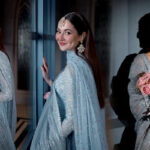
Fashion and celebrity culture often spark debates in Pakistan, where the line between personal choice and public expectations can sometimes blur. Recently, actress Nazish Jahangir found herself at the center of heated criticism after a picture of her in a sleeveless outfit went viral on social media. What could have been a simple style choice soon became the talk of the town, with fans and critics alike voicing strong opinions.
This controversy sheds light not just on one celebrity but also on the complex relationship between tradition, modernity, and women’s freedom of expression in Pakistani society.
The Incident That Sparked Debate
The uproar began when Nazish Jahangir shared a picture on her Instagram profile wearing a chic sleeveless dress. For many, the outfit was a simple fashion statement, but in a country where clothing choices are often tied to cultural values, the post quickly stirred up debate.
Her look was met with divided reactions. Admirers praised her confidence and elegance, calling her one of the few Pakistani actresses bold enough to express herself freely. However, a large number of social media users criticized her for “crossing boundaries,” arguing that public figures should dress conservatively to set an example.
Social Media Backlash
In the age of Instagram and Twitter, no celebrity action goes unnoticed. Within hours of posting her photo, Nazish Jahangir was trending on social media. The criticism ranged from harsh comments about her choice of attire to more serious accusations of “promoting Western culture.”
Some users called her “un-Islamic” and demanded she delete the picture, while others defended her right to wear whatever she likes. The situation quickly turned into a battleground of ideas, with freedom of expression clashing against cultural conservatism.
Interestingly, many younger fans came to her defense, highlighting that fashion is personal and that women should not constantly face judgment for their clothes. This generational divide revealed how the conversation about women’s clothing in Pakistan is evolving.
The Pressure on Female Celebrities
This isn’t the first time a female celebrity in Pakistan has faced backlash for her wardrobe choices. From Mahira Khan to Saba Qamar, nearly every star has faced criticism for “crossing limits” when it comes to clothing.
For actresses like Nazish Jahangir, the pressure is particularly intense. As a rising star in television dramas, she is constantly in the spotlight, where every outfit, statement, or public appearance is scrutinized. While male actors rarely face this level of personal criticism, female stars often carry the weight of public morality on their shoulders.

This double standard raises important questions about gender equality and the space women are allowed in the entertainment industry.
Nazish Jahangir’s Career in the Spotlight
Amid the controversy, it is worth remembering that Nazish Jahangir is not just a celebrity known for fashion choices but also a talented actress with an impressive career. She has made a name for herself in popular dramas, gaining recognition for her acting skills, screen presence, and ability to portray diverse characters.
Over the years, she has appeared in hit projects that resonated with audiences, proving her versatility. Her journey reflects hard work, passion, and dedication to her craft. Unfortunately, her achievements often take a back seat in media discussions, overshadowed by debates about her appearance and attire.
This controversy highlights how female celebrities are often reduced to their clothing choices rather than celebrated for their professional contributions.
A Larger Cultural Conversation
The criticism against Nazish Jahangir is not just about one photo; it represents a larger cultural tension in Pakistan. On one hand, society takes pride in modern achievements and the global success of its artists. On the other, traditional values still hold significant influence, often clashing with ideas of personal freedom.
Clothing, especially for women, becomes a symbolic battleground where identity, morality, and modernity intersect. Every time a celebrity like Nazish is criticized, it reflects not only public opinion but also deeper societal struggles about change, acceptance, and cultural identity.
The Role of Media
Media platforms play a huge role in amplifying controversies. Instead of focusing on her artistic contributions, many outlets ran headlines about Nazish Jahangir “wearing sleeveless” as if it were a scandal. Such coverage fuels public outrage and shifts attention away from important issues like women’s empowerment in the arts.
At the same time, the debate creates traction and engagement, which is why entertainment portals highlight such controversies. Unfortunately, this cycle often benefits media outlets more than it does the artists who become targets of scrutiny.
Support from Fans and Fellow Celebrities
Despite the criticism, Nazish Jahangir also received massive support. Fans pointed out that fashion is subjective and that no one has the right to dictate how a woman dresses. Several fellow actors subtly showed solidarity, hinting that women in the industry should not be policed for personal choices.
Supporters emphasized that Pakistani entertainment is evolving and that audiences must learn to differentiate between on-screen roles and real-life identities. Celebrities are human beings with personal styles, not role models obligated to meet everyone’s expectations.

Why This Debate Matters
The reason this incident matters is not because of a dress but because it reflects ongoing societal debates about women’s freedom. Whether it’s Mahira Khan being trolled for smoking or Nazish Jahangir being bashed for sleeveless attire, the scrutiny reinforces how women in public spaces are judged more harshly than men.
By focusing on clothing instead of talent, society risks discouraging artists from expressing themselves freely. Moreover, it sends a troubling message to young women: that their worth will always be measured by how they look, not by what they achieve.
Conclusion
The controversy surrounding Nazish Jahangir wearing sleeveless attire is more than just a social media storm—it is a mirror reflecting Pakistan’s ongoing struggle between tradition and modernity. While criticism and backlash continue, her supporters argue that women should have the right to dress as they please without being shamed.
At the end of the day, Nazish’s choice of clothing should not overshadow her achievements as an actress and an artist. Her work in television dramas has contributed to the entertainment industry, and she deserves recognition for her talent, not condemnation for her fashion.
As society progresses, it is crucial to move away from judgmental attitudes and focus instead on appreciating the artistry, dedication, and individuality of celebrities like Nazish Jahangir.


